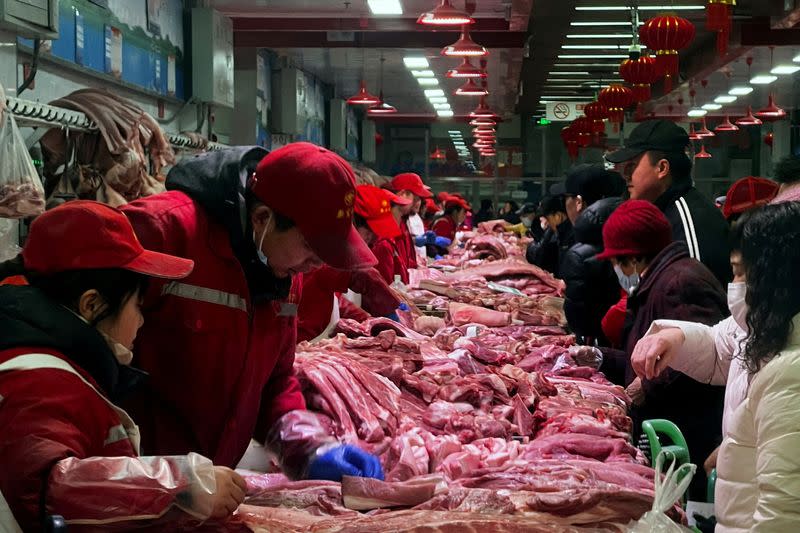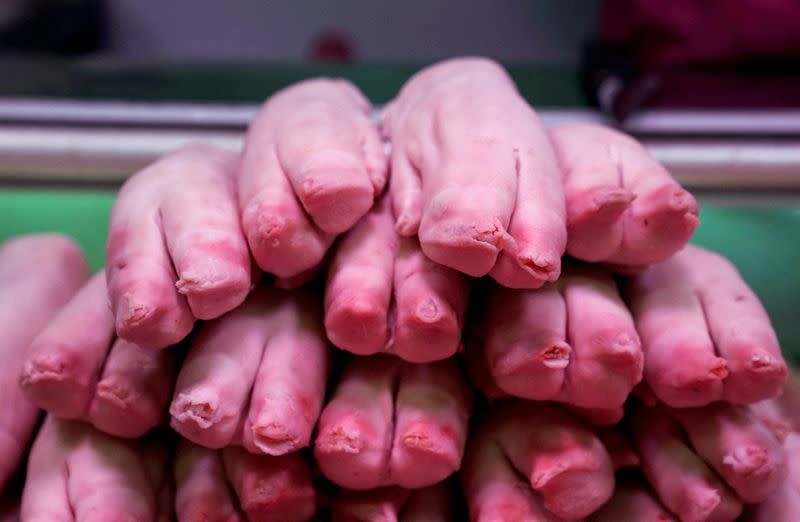EU pork industry faces 'nightmare' if China restricts imports
By Michael Hogan and Belén Carreño
HAMBURG/LLEIDA (Reuters) - Europe's pork industry faces a "nightmare scenario" of lower prices and falling profitability if China restricts imports from the region, industry executives and analysts said on Friday.
Chinese firms have asked for an anti-dumping probe into pork imports from the European Union, state-backed Chinese media reported on Friday, escalating tensions after the bloc imposed anti-subsidy duties on Chinese-made electric vehicles.
China imported $6 billion worth of pork, including offal, in 2023 and more than half came from the EU, Chinese customs data showed. Ending those orders would result in a huge loss of business for Europe's meat industry.
"The full suspension of EU pork exports to China would be a potential nightmare scenario for the pork supply chain, with implications across the EU," said Justin Sherrard, global strategist animal protein at Rabobank.
Sherrard added that the disruption would be felt across pork supply chains in Europe, resulting in lower prices and profit margins on unwanted stock produced by the region's farmers.
China buys pig meat including ears, noses and feet, for which there is little demand from European customers. The ability to export those parts of the animal helps generate a higher value for the whole carcass, analysts say.
"It would take time, but may be possible for EU exporters to find alternative markets for the pork muscle meat cuts that are currently shipped to China," Sherrard said. "However, I doubt alternative markets could be found for EU pork 'variety meat' exports that are currently shipped to China.
'PAINFUL'
Spain is the largest exporter of pork to China globally, selling about $1.5 billion of product every year.
Speaking to reporters in the Spanish livestock hub of Lleida, Spain's industry minister said both regions would lose out if the measures took effect.
"The other day I was with the Chinese Minister of Trade and Industry, and we were all in agreement that we should not fall into the dynamics of trade wars," he said.
Interporc, which represents Spanish pork producers, echoed that sentiment.
"What we hope is that the relationship between the EU and China will always be a good one, and we are working to ensure that this good relationship continues," it said.
Germany's pork industry has already suffered an import ban by China since 2020 after the disease swine fever was found in Germany.
Its largest meat processor Toennies expects pork prices to fall if exporters such as Spain seek new markets for lost Chinese sales resulting in a "painful loss of income".
"If EU exporters, particularly Spain, cannot sell pork to China, some sales would have to be made within Europe and downward pressure on EU pork prices can be expected," said Toennies spokesperson Thomas Dosch.
After finding themselves unable to sell pork to China following the swine fever ban, Germany's pork producers sought alternative uses for unwanted pig parts including as ingredients in sausages, pet food and industrial fats.
"While alternative uses can be found, they are not as profitable as selling directly to China," said Dosch.
South America could benefit if China seeks alternative supplies, experts say.
"This would especially be expected to involve extra sales from Brazil to China, which has been expanding its export capability in past years," said Tim Koch, meat analyst at German market consultancy AMI.
Russia could step in to make up for some of the lost exports from Europe, said Jean-Paul Simier, a French meat analyst and contributor to commodities review Cyclope.
"Russia has boosted its production of pork and beef. It is now self-sufficient in pork," he said, adding that it had begun to sign agreements on food safety with China.
(Reporting by Michael Hogan in Hamburg and Belen Carreno in Lleida; Additional reporting by Emma Pinedo in Lleida and Gus Trompiz in Paris; Editing by Matt Scuffham, Gareth Jones and Jan Harvey)

 Yahoo Finance
Yahoo Finance 

